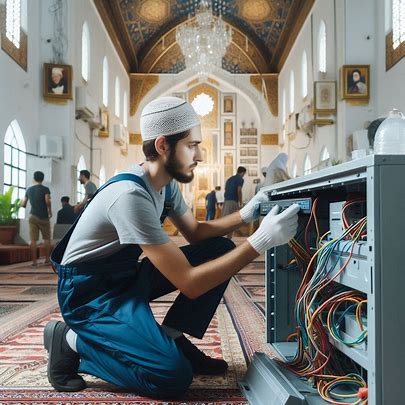
Air quality directly affects the well-being of people gathering in enclosed spaces. Poor air circulation can lead to discomfort, allergies, and even illness in churches, mosques, synagogues, or political halls. Regular air conditioning maintenance ensures that attendees can breathe cleaner air, reducing the spread of airborne allergens and bacteria.
Ensuring proper air conditioner maintenance is essential for these spaces. Regular air conditioner cleaning through cleaning services in Brisbane, like Advanced Clean Air (cleaning services Brisbane), helps prevent dust buildup and mold growth, improving indoor air quality. This simple yet effective practice promotes a healthier environment for congregants, political figures, and audiences.
Why Air Quality Matters in Places of Worship
Places of worship are designed for reflection, prayer, and communal gathering. Large groups often spend hours in these spaces, making air quality a crucial factor. Dust, mold spores, and bacteria can circulate if ventilation systems are neglected, leading to respiratory issues and allergic reactions. Poor air quality can also make the environment feel stuffy and uncomfortable, which affects concentration and the overall experience of worshippers.
Many religious institutions operate in historic buildings, some of which have outdated HVAC systems. These older systems may not efficiently filter air, allowing pollutants to accumulate over time. Regular maintenance and upgrades ensure that congregants can worship in a clean and safe environment.
The Impact on Political Halls
Political halls, where debates and discussions occur, rely on good air circulation. With multiple speakers and large audiences, clean air ensures speech clarity and minimizes distractions caused by discomfort or irritation. Poor ventilation can lead to fatigue, reduced concentration, and even the spread of airborne illnesses.
Political gatherings often involve people from diverse backgrounds and varying health conditions. Some attendees may be particularly sensitive to allergens or have pre-existing respiratory issues. Ensuring high air quality through proper air conditioning maintenance creates a more inclusive and comfortable space for all.
Health Benefits of Proper Ventilation
Maintaining air conditioning systems is not just about comfort—it directly impacts health. Clean air reduces the risk of respiratory infections, minimizes exposure to pollutants, and creates a more pleasant atmosphere for everyone present. High humidity levels in enclosed spaces can lead to mold growth, triggering allergies and asthma attacks. Proper air circulation helps regulate humidity and keeps mold at bay.
Airborne illnesses such as colds and flu can spread rapidly in crowded spaces. A well-maintained air conditioning system helps filter out bacteria and viruses, reducing the likelihood of outbreaks among attendees.
How Air Conditioning Maintenance Helps
Regular maintenance includes cleaning filters, inspecting ducts, and ensuring efficient airflow. This prevents dust accumulation and mold growth, contributing to poor air quality. Such maintenance is essential in high-traffic spaces like places of worship and political halls.
Dirty air filters force air conditioning units to work harder, increasing energy consumption and reducing efficiency. Regular cleaning improves air quality and lowers energy costs, making it a cost-effective solution for religious and political institutions.
Simple Steps to Improve Air Quality
Improving air quality does not have to be complicated. Here are some simple but effective steps:
- Schedule regular air conditioner maintenance.
- Use high-quality air filters.
- Ensure proper ventilation with open windows and air purifiers.
- Encourage attendees to practice hygiene to reduce airborne contaminants.
- Invest in dehumidifiers to prevent mold growth in humid climates.
- Regularly clean carpets and upholstery to reduce dust accumulation.
Final Thoughts
Clean air is essential in ensuring the comfort and health of people gathering in religious and political spaces. By prioritizing air conditioning maintenance, these venues can provide a safer and more comfortable environment for all. Regular upkeep prevents health issues and enhances the overall experience for attendees, speakers, and leaders alike.
Taking proactive steps to improve air quality benefits everyone. Clean air fosters focus, engagement, and well-being in a quiet place of worship or a bustling political hall. Investing in proper ventilation and regular maintenance is not just a necessity—it is a commitment to the health and comfort of the community.


